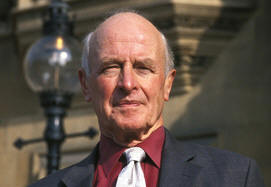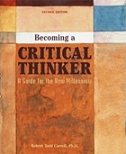From Abracadabra to Zombies
Book Review
 The
March of Unreason: Science, Democracy, and the New Fundamentalism.
The
March of Unreason: Science, Democracy, and the New Fundamentalism.
Oxford University Press (2006)
by Dick Taverne
new U.S. edition
There have been a number of books published in recent years that have lamented the loss of Enlightenment values to a rising storm of unreason and irrationality. The good old days of the Enlightenment, or so goes the myth, were days of optimism and hope buoyed by faith in reason, toleration of conflicting ideas, and combat in the marketplace of ideas rather than on the battlefield. In the west, liberal democracies arose from the ashes of oppressive, intolerant societies. As science advanced, the power of the churches waned. In America, we were lucky to have founders like Jefferson and Madison who knew that freedom from tyranny was essential to the continuance of the Enlightenment but that freedom would lead to conflict that had to be controlled. The danger, they knew, was to become intolerant and dogmatic to maintain order. Democracy would be a messy business. The only hope for a free society was to put up roadblocks to those factions and special interests that would force us all to follow their chosen path if they had the power. No church would be a state church. All religions would be equal before the law. We would have a Constitution that would guarantee rights of citizens against the encroachment of power from the government, the churches, and our neighbors. The price we pay for this liberty is that the marketplace will overflow with mediocrity and every kind of stupidity and inanity, as well as some genius and creative thought. Disdain for reason, contempt for science, advocacy of superstitions and all forms of nonsense will vie for attention along with the values of the Enlightenment. As ugly as our world sometimes get, it is better than the alternative: an oppressive regime that would force us all to think straight. As Winston Churchill said: "Democracy is the worst form of government, except for all those other forms that have been tried from time to time."
Unlike most of the other books I've read that decry the loss of respect for reason and science among politicians and the general public, Dick Taverne's book concludes optimistically. In his final chapter, entitled "Reason and Democracy," he reminds us that things could be much worse. We could live in an undemocratic society ruled by an oppressive government where there is no freedom of religion or speech, and where, he notes, nothing much of value has emerged in hundreds of years. The things we have come to value in the liberal democracies—art, music, literature, science, technology, sports and other leisure activities—stagnate under totalitarian regimes. "A glance around the world today," he notes, "reveals that science flourishes in countries where liberal democracy is enthroned and the rights of the individual are protected."
So, yes, we live in a world where horoscopes are valued more than science by many people, where absurdities like homeopathy are increasing in popularity, where entertainment has taken a decidedly paranormal turn toward ghosts and spiritism and psychic nonsense, but we are free to criticize astrology, anti-scientific medicine, and psychic mediumship. Or not. In either case, we should not whine about the fact that our arguments don't persuade large numbers of people. As long as the irrationalists are not in power and not writing laws that force us to think like them, we have to accept that our liberty depends on their freedom to believe what they want, no matter how stupid or false. Toleration of the wrong and the misguided is a price we must pay for our liberty. Anyway, your neighbor who has been trying to get you to take Chinese herbs every time you cough will be taken by ambulance to a real hospital, not a homeopathic clinic, if she calls 911. In the U.S., at least, prospective employers aren't going to ask you what your star sign is before they will consider hiring you. So far, no medium has been allowed in court to invoke the dead to testify.
Taverne also cites Karl Popper in defense of the notion that there is an essential connection between liberal democracies and an improving standard of living. "Societies progress by the free assertion of differing proposals, followed by criticism, followed by the genuine possibility of change in the light of criticism....The whole approach of an authoritarian society is anti-rational. A rational and scientific approach requires societies to be open and pluralistic."
 Throughout the book, Taverne argues that the rejection of reason and the
evidence-based approach to problem solving and policy making "undermines a
civilized society and ultimately democracy." The main proponents of unreason
today, he argues, are those who prefer superstition to modern medicine,
mysticism to science in agriculture (the
"organic" is spiritually
better crowd), and what he calls the "semi-religious
opposition to GM [genetically modified] crops."* Taverne served in the House
of Commons and various government posts in the UK, which brought him into contact with
the proponents of homeopathy and the opponents of GM crops. He found
rational debate with these groups to be nearly impossible because they
reject or subordinate reason to the passion of their causes. They are the
modern equivalent of medieval theologians, who saw reason as the handmaiden
of faith and their job as defending dogma that had been established by
divine authority.
Throughout the book, Taverne argues that the rejection of reason and the
evidence-based approach to problem solving and policy making "undermines a
civilized society and ultimately democracy." The main proponents of unreason
today, he argues, are those who prefer superstition to modern medicine,
mysticism to science in agriculture (the
"organic" is spiritually
better crowd), and what he calls the "semi-religious
opposition to GM [genetically modified] crops."* Taverne served in the House
of Commons and various government posts in the UK, which brought him into contact with
the proponents of homeopathy and the opponents of GM crops. He found
rational debate with these groups to be nearly impossible because they
reject or subordinate reason to the passion of their causes. They are the
modern equivalent of medieval theologians, who saw reason as the handmaiden
of faith and their job as defending dogma that had been established by
divine authority.
While there is a chapter on medicine and magic, most of Taverne's book is devoted to defending the benefits of conventional agriculture and GM crops and exposing what he sees as the deceit and irrationality of a number of environmental groups whose opposition to GM crops is based on mysticism and faith, rather than evidence, and argued for by appeal to "the Precautionary Principle" (PP) (capital Ps) taken to the extreme: never take a risk. The PP is never stated this explicitly, of course, but that is the effect because the argument made by the opponents of GM crops is that some risks should not be taken until we are absolutely certain that potentially devastating harms are impossible. This is an absurd requirement, of course. As Taverne puts it:
...if the lack of absolute proof of the absence of potential harm were grounds for opposing new technology, we should oppose every technology, indeed dispense with the applications of science altogether.
The Precautionary Principle allows a contrarian to support or oppose an action without having to provide any evidence in favor of taking or not taking that action. To prevent a new technology from being studied or implemented, one need only note that some terrible consequences might occur if the technology is developed and caution that we not take any action until we have absolute proof that nothing terrible will happen if we go forward. This is the approach of many who oppose genetically modified crops, according to Taverne.
To bring an end to a current technology one need only note that some terrible consequences might be occurring because of the technology and we should end it until we have absolute proof that the technology isn't causing the terrible things the contrarian suspects it of causing. This is the approach of many who oppose thimerosal in vaccines or combining several immunizations in one shot, and those who demand that power lines be put underground to prevent potential harm from EMFs or that Wi-Fi or cell phones not be used because of fears of potential harmful effects.
Better to err on the side of caution the contrarian can say and almost guarantee that the fear he has aroused will generate loud and extensive support from the masses and the media. Nothing motivates like fear and nothing makes the job of the contrarian motivator easier than being able to arouse a great fear while being able to ignore any evidence that the fear is unfounded.
Those who appeal to the Precautionary Principle are not simply common-sense folks, advising caution before doing anything risky. It is, of course, sensible to carefully consider, to the best of our ability, all the potential consequences of a new technology before moving ahead with it. As Lisa M. Ellman and Cass R. Sunstein put it: "A more refined and sensible version of the precautionary principle amounts to balancing risks against risks, rather than accepting a general (and almost comically unhelpful) plea for risk aversion."* The folks Taverne criticizes have taken better safe than sorry to the extreme of take no risks because this area is holy ground.
The book has interesting chapters on what Taverne calls the "eco-fundamentalists" and on the fallout of postmodernism on attitudes toward science. His book will be rejected by many idealists who are convinced that government and corporate conspiracies hinder the spread of wealth to the poor and the poorer nations. Taverne defends capitalism, globalization, and corporations. He is not oblivious to the many justified criticisms of how businesses and governments work in the 21st century. In fact, he lists many of them in his book and agrees with them. He thinks it is immoral the way animals are treated on many large farms. He does not approve of the way greedy CEOs take obscene salaries and incentives and he decries the crimes of Enron leaders and the like. But he also thinks it is immoral to attack those who disagree with you by attacking their suspected motives or denouncing their data without providing evidence that you're right and the one you are attacking is wrong. I won't go into detail here, but Taverne provides a lengthy defense of Bjorn Lomborg's The Skeptical Environmentalist: Measuring the Real State of the World. Lomborg, like Taverne, has been pummeled by environmental groups for his optimism. The reader should examine Taverne's book and decide for herself who has the better arguments.
Taverne's book provides an antidote to the profound pessimism of the extreme environmentalists without becoming Pollyannaish or irresponsibly incautious. Some might find it disturbing that NGOs (non-governmental organizations) claiming to be concerned about protecting the environment will sometimes distort or ignore evidence to make their case. At times, groups like the International Federation of Organic Agriculture Movements (IFOAM), the Soil Association, Friends of the Earth (FOE), the Environmental Defense Fund (EDF), the Sierra Club, ActionAid International, and Taverne's arch-enemy Greenpeace not only get it wrong but don't seem to care to correct matters when their errors are identified. Sometimes these groups don't seem to care what the evidence is: they know they're right and they're sticking to their beliefs. They sound like George W. Bush: "I know what I believe. I will continue to articulate what I believe and what I believe—I believe what I believe is right."*
Contents
Robert Todd Carroll
October 28, 2007



